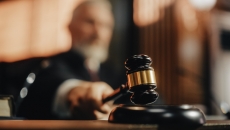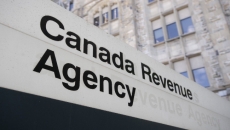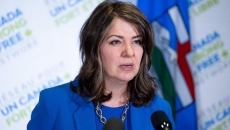British Columbia's three party leaders offered starkly different visions of the province and its future Tuesday in the only televised debate of what appears to be an increasingly close election campaign.
The 90-minute exchange of views involving NDP Leader David Eby, B.C. Conservative Leader John Rustad and Green Party Leader Sonia Furstenau, hosted by Angus Reid Institute president Shachi Kurl, sometimes made for grim listening.
It also saw Furstenau — who said she knows her party will not form government after the Oct. 19 election — portray both Eby and Rustad as near-look-alikes on critical issues of health care, the overdose crisis and subsidizing the fossil fuel industry.
Rustad told of seeing a man dead on the streets of Vancouver — of an overdose, he said — on his way to the debate venue at the CBC's studio.
"I was on my way over here, and on the corner of Robson and Hornby, there was an individual who died … This is the British Columbia that David Eby has created," Rustad said.
At a post-debate news conference, Rustad did not elaborate on exactly what he witnessed, but said the province's overdose crisis had resulted in people dying on city streets.
"This is not normal," he said.
During the debate, Rustad also related an anecdote about a woman "covered in blood" after miscarrying in a hospital washroom as he attacked the state of health care in B.C.
He said too many young people were leaving the province due to the high cost of housing and what he described as a lack of opportunity, prompting exasperation from Furstenau — who also delivered an early zinger against both her rivals by describing them as "more of the same or back to the past."
"I feel like I live in a different place from John Rustad — his vision of B.C. is one that is dark and gloomy," said Furstenau. "We need a vision of hope. If we want young people to stay here, we have to give them a reason to stay."
She said Rustad's vision of Indigenous rights was based on a "colonial" attitude of domination as opposed to creating long-term certainty for all B.C. residents.
"It's fascinating to me John Rustad's vision for the province is one rooted somewhere in 1957," Furstenau said.
"I mean, he cannot look ahead because he can only look back. He is so limited in his imagination of what's possible."
For his part, Eby remained squarely focused on Rustad and his stances on various social issues, describing him as an "anti-vaxxer" who was "embarrassing" the province.
"When we were all rolling up our sleeves to get vaccines, to protect vulnerable seniors from COVID-19 … John Rustad and his candidates were providing donations to people who are protesting outside of hospitals, anti-vax convoy members. He's still an anti-vaxxer."
Eby said he would rather be discussing other important issues during the campaign but voters should know about Rustad's views and those of some of his candidates.
"I would much rather be talking about the fact he doesn't have a costed platform," said Eby. "It's important for you to know who's on his team, who the next health minister could be."
Rustad has previously said he regretted getting vaccinated against COVID-19, but told the debate that he was "not anti-vax, I'm anti-mandate."
Eby and Furstenau both trained attacks on Rustad, and Eby pointedly avoided criticizing Furstenau, who said that the "least polarized" time in B.C. had been when the Greens supported the NDP from 2017 to 2020 in the minority government of former premier John Horgan.
When Eby pointed to Rustad's "uncosted" economic platform, which he said was written in "pixie dust," he compared it unfavourably to Furstenau's costed policies. In closing remarks, Eby said "Sonia's right" to think of B.C.'s biggest assets being British Columbians.
The Green leader did not offer Eby the same consideration, criticizing him and Rustad for being aligned on health care and subsidizing the fossil fuel industry.
All three leaders had spent the day preparing for what could prove a pivotal moment for the campaign, with the B.C. Conservatives and the NDP locked in what polls suggest will be a narrow race, with less than two weeks to go before election day.
The debate had started with all three leaders on the defensive — not against each other but the moderator.
It featured no opening statements, instead beginning with individual questions from Kurl.
She pointed to the province's shift from surplus to deficit under Eby's government, asking him when things would improve.
Eby responded by saying families were under pressure and "people need support now."
Asked how he could convince people he wasn't "too extreme," Rustad said a "lot of things" had been said about him but he was "laser-focused" on the needs of people in the province.
Furstenau meanwhile responded to a question about why people would vote for a party with only two people in the legislature, by delivering her "more of the same or back to the past" line about both Eby and Rustad
The debate was broadcast on all major TV networks.
Supporters outside the studio had cheered on the leaders as they made their way inside.
Eby arrived on the NDP election bus with wife Cailey Lynch and about two dozen supporters, Rustad was greeted by a largely youthful crowd waving blue party placards and Furstenau arrived with a handful of supporters.
At times, the NDP and B.C. Conservative supporters appeared to be in a friendly contest to out-cheer each other.
Rustad earlier Tuesday released his party’s proposals for dealing with the toxic drug crisis in the province, which include cutting wait times for voluntary treatment and creating a virtual program to connect people with addiction specialists.
He also said his party wanted to redevelop and repurpose the Riverview Hospital in the Vancouver suburb of Coquitlam, a provincially-owned psychiatric institution that closed in 2012.
The leaders of British Columbia's main parties have squared off in their only televised debate ahead of the Oct. 19 provincial election.
Here are some quotes from NDP Leader David Eby, B.C. Conservative Leader John Rustad and Green Party Leader Sonia Furstenau:
"I was on my way over here, and on the corner of Robson and Hornby, there was an individual who died, and there was emergency people rushing (around). This person died from an overdose. This is the British Columbia that David Eby has created." — Rustad describing a scene on his way to the debate in downtown Vancouver.
"Climate change is real. Vaccines work. We don't call gay people groomers. We respect people. We respect Indigenous people. We don't promote hate and division." — Eby describing his party's positions, in apparent reference to Rustad's.
"What these two are offering is either more of the same or back to the past." — Furstenau on Eby and Rustad.
"I'll ask you this: in seven years of NDP has anything been better? Has housing improved?" — Rustad.
"The NDP seem to have approached health care with the idea that there's nothing that one more V.P. and seven more project managers can't solve when, in fact, what we have to do is ensure that health-care spending is being focused on the delivery of health care by the professionals who were trained to do it." — Furstenau.
"We tried it. It didn't produce the results. So, we had to change course." — Eby on decriminalization.
"John Rustad's vision for this province is one that's rooted somewhere around 1957. I mean, he cannot look ahead because he can only look back. He is so limited in his imagination of what's possible." — Furstenau.
"The reality is, I'm triple vaccinated. I'm not anti-vaxx. I'm anti-mandate." — Rustad responding to Eby calling him an anti-vaxxer.
"We don't have a candidate that says vaccines give you AIDS." — Eby on the B.C. Conservatives.






